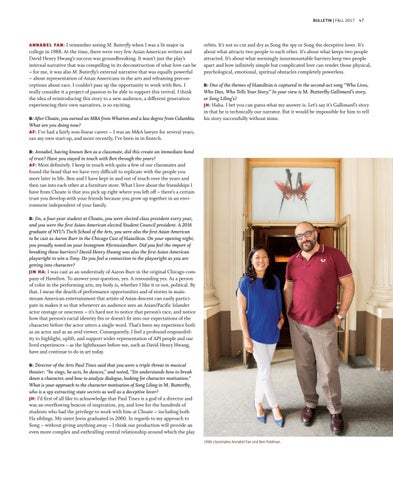BULLETIN | FALL 2017 47
ANNABEL FAN: I remember seeing M. Butterfly when I was a lit major in
college in 1988. At the time, there were very few Asian American writers and David Henry Hwang’s success was groundbreaking. It wasn’t just the play’s internal narrative that was compelling in its deconstruction of what love can be – for me, it was also M. Butterfly’s external narrative that was equally powerful – about representation of Asian Americans in the arts and reframing preconceptions about race. I couldn’t pass up the opportunity to work with Ben. I really consider it a project of passion to be able to support this revival. I think the idea of reintroducing this story to a new audience, a different generation experiencing their own narratives, is so exciting. B: After Choate, you earned an MBA from Wharton and a law degree from Columbia.
orbits. It’s not so cut and dry as Song the spy or Song the deceptive lover. It’s about what attracts two people to each other. It’s about what keeps two people attracted. It’s about what seemingly insurmountable barriers keep two people apart and how infinitely simple but complicated love can render those physical, psychological, emotional, spiritual obstacles completely powerless. B: One of the themes of Hamilton is captured in the second-act song “Who Lives, Who Dies, Who Tells Your Story.” In your view is M. Butterfly Gallimard’s story, or Song Liling’s? JH: Haha. I bet you can guess what my answer is. Let’s say it’s Gallimard’s story in that he is technically our narrator. But it would be impossible for him to tell his story successfully without mine.
What are you doing now? AF: I’ve had a fairly non-linear career – I was an M&A lawyer for several years,
ran my own start-up, and more recently, I’ve been in in fintech. B: Annabel, having known Ben as a classmate, did this create an immediate bond of trust? Have you stayed in touch with Ben through the years? AF: Most definitely. I keep in touch with quite a few of our classmates and found the bond that we have very difficult to replicate with the people you meet later in life. Ben and I have kept in and out of touch over the years and then ran into each other at a furniture store. What I love about the friendships I have from Choate is that you pick up right where you left off – there’s a certain trust you develop with your friends because you grow up together in an environment independent of your family. B: Jin, a four-year student at Choate, you were elected class president every year, and you were the first Asian American elected Student Council president. A 2016 graduate of NYU’s Tisch School of the Arts, you were also the first Asian American to be cast as Aaron Burr in the Chicago Cast of Hamilton. On your opening night, you proudly noted on your Instagram #firstasianBurr. Did you feel the import of breaking these barriers? David Henry Hwang was also the first Asian American playwright to win a Tony. Do you feel a connection to the playwright as you are getting into character? JIN HA: I was cast as an understudy of Aaron Burr in the original Chicago company of Hamilton. To answer your question, yes. A resounding yes. As a person of color in the performing arts, my body is, whether I like it or not, political. By that, I mean the dearth of performance opportunities and of stories in mainstream American entertainment that artists of Asian descent can easily participate in makes it so that whenever an audience sees an Asian/Pacific Islander actor onstage or onscreen – it’s hard not to notice that person’s race, and notice how that person’s racial identity fits or doesn’t fit into our expectations of the character before the actor utters a single word. That’s been my experience both as an actor and as an avid viewer. Consequently, I feel a profound responsibility to highlight, uplift, and support wider representation of API people and our lived experiences – as the lighthouses before me, such as David Henry Hwang, have and continue to do in art today. B: Director of the Arts Paul Tines said that you were a triple threat in musical theater: “he sings, he acts, he dances,” and noted, “Jin understands how to break down a character, and how to analyze dialogue, looking for character motivation.” What is your approach to the character motivation of Song Liling in M. Butterfly, who is a spy extracting state secrets as well as a deceptive lover? JH: I’d first of all like to acknowledge that Paul Tines is a god of a director and was an overflowing beacon of inspiration, joy, and love for the hundreds of students who had the privilege to work with him at Choate – including both Ha siblings. My sister Jeein graduated in 2000. In regards to my approach to Song – without giving anything away – I think our production will provide an even more complex and enthralling central relationship around which the play 1986 classmates Annabel Fan and Ben Feldman.
185710_Fall_Bulletin_T.indd 47
10/16/17 12:24 PM
